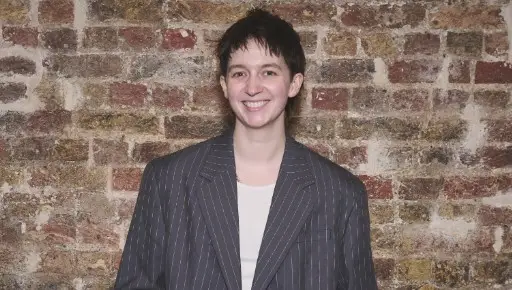Ros Watt Actor: A Rising Scottish Star Redefining Modern Theatre

Ros Watt, the talented Scottish actor, has quickly emerged as one of the most compelling new voices in contemporary theatre. Known for their fearless performances, authenticity, and ability to transform classical characters into modern reflections of humanity, Ros represents the next generation of performers who are reshaping the boundaries of storytelling. Born and raised in Scotland, Ros grew up immersed in a culture deeply connected to literature, poetry, and the performing arts. This early exposure shaped their desire to express complex emotions through performance and connect audiences with meaningful narratives.
Ros Watt identifies as trans-masculine and non-binary, using he/they pronouns. Their personal journey of self-discovery has been deeply interwoven with their artistic evolution, making their performances all the more genuine and resonant. Their work consistently challenges traditional perceptions of gender in theatre, especially within the classical and Shakespearean canon.
Education and Training
Ros Watt trained at the prestigious Royal Central School of Speech and Drama, one of the United Kingdom’s most respected performing arts institutions. They graduated with a BA (Hons) in Acting, focusing on Collaborative and Devised Theatre. This specialisation shaped their unique approach to performance—rooted in creativity, teamwork, and experimentation.
During their training, Ros learned to balance technical discipline with emotional spontaneity. They explored a wide range of theatrical traditions, from devised performance and movement work to voice training and classical text analysis. It was here that they began to discover how to reinterpret historic works with a modern sensibility—an approach that would later define their acting career.
Breakthrough and Major Roles
Ros Watt’s most recognisable role so far has been their portrayal of Malcolm in Macbeth at the Donmar Warehouse. The production later transferred to the West End and was also filmed for cinema release, giving audiences worldwide a glimpse of Ros’s magnetic stage presence. Playing Malcolm—a character often overshadowed by Macbeth and Lady Macbeth—Ros brought a refreshing vulnerability and inner strength to the role.
Their performance stood out not only for its emotional clarity but also for how it redefined what power and leadership can look like. Through their interpretation, Malcolm became a symbol of youthful determination and moral courage, rather than just a secondary royal figure. The role demonstrated Ros’s ability to blend subtle psychology with commanding presence, establishing them as a performer capable of elevating complex characters.
Beyond Macbeth, Ros Watt appeared in Dracula: Mina’s Reckoning with the National Theatre of Scotland, a production that received critical acclaim for its atmospheric storytelling and emotional intensity. Their television work includes the BBC series Shetland, where they brought authenticity to a nuanced character in a crime-drama setting.
Acting Philosophy and Method
Ros Watt’s acting method revolves around deep understanding and empathy. They often begin by translating classical dialogue into modern English to grasp the emotional core of a character. Rather than focusing purely on physical gestures or vocal tone, Ros aims to uncover the psychological motivations that drive behaviour.
This thoughtful approach reflects their broader belief in accessibility. They often speak about the importance of making Shakespeare and classical theatre relevant to modern audiences—removing linguistic and social barriers so that everyone can see themselves represented on stage. In their interviews, Ros has explained that their process involves layering meaning: combining the historical context of the play with personal experience and contemporary themes of identity, power, and transformation.
Representation and Inclusion in Theatre
As a trans-masculine actor, Ros Watt has been vocal about representation within the performing arts. They believe that theatre should reflect the diversity of real life, both on stage and behind the scenes. Their visibility has inspired conversations about gender inclusivity, casting practices, and the power of authentic representation in classical theatre.
Ros’s presence in high-profile productions challenges the old stereotypes that often dominate stage casting. By embodying traditionally male roles in Shakespearean works, they redefine what masculinity looks like in performance. Their approach invites audiences to think critically about identity and how art can bridge human differences rather than reinforce divisions.
In discussing inclusivity, Ros emphasises that trans and non-binary performers should not be limited to trans-specific roles. They advocate for open casting, where actors are chosen for their skill and interpretation rather than preconceived notions of gender or appearance. This progressive stance has earned them admiration from both emerging and established theatre professionals.
Artistic Challenges and Growth
Although Ros Watt’s rise has been impressive, their journey has not been without challenges. Like many artists entering the industry, they have faced the dual struggle of finding consistent work while also navigating the complexities of representation in a traditional field.
However, rather than viewing these challenges as barriers, Ros uses them as creative fuel. Each project becomes a chance to break conventions and tell stories that matter. Their dedication to authentic expression often leads them toward roles that demand emotional risk, depth, and honesty. It is this courage that continues to set them apart in an increasingly competitive field.
The Power of Storytelling
What makes Ros Watt’s artistry remarkable is their understanding of storytelling as a form of healing and connection. They approach acting as a dialogue between performer and audience—a shared exploration of vulnerability, truth, and transformation.
In an age where audiences crave genuine emotional experiences, Ros’s performances offer both reflection and catharsis. Whether embodying a Shakespearean prince or a modern-day character, they bring an intensity that feels raw yet carefully crafted. Their work reminds viewers that theatre is not just entertainment; it is an act of empathy that bridges generations, cultures, and identities.
Vision for the Future
Looking ahead, Ros Watt’s career trajectory seems destined for continued growth. Their blend of classical training, emotional intelligence, and modern perspective positions them as one of the most promising talents in British theatre today.
Many expect them to expand further into film and television while continuing to champion diversity in performing arts. Their ability to reinterpret iconic roles through a contemporary lens could lead to more collaborations with major theatres, creative directors, and film studios seeking inclusive storytelling.
At the same time, Ros has shown interest in writing and devising their own work—a natural progression for someone trained in collaborative theatre. This suggests that their future contributions may go beyond acting to include directing or dramaturgy, shaping the next generation of British performance from multiple angles.
Influence on the Next Generation
For young aspiring actors, especially those from underrepresented backgrounds, Ros Watt stands as a powerful symbol of possibility. Their success illustrates that talent, authenticity, and courage can transcend traditional boundaries. By staying true to their identity while mastering their craft, Ros demonstrates how personal truth can coexist with professional excellence.
Their journey encourages young performers to embrace who they are rather than conform to outdated expectations. In interviews, Ros often highlights that being different is not a limitation but a strength—one that brings richness and authenticity to artistic work.
Impact on Modern Theatre Culture
The presence of actors like Ros Watt is reshaping the culture of British theatre. Their work prompts artistic institutions to re-evaluate casting traditions, training systems, and audience expectations. Through their performances, Ros contributes to a broader conversation about what it means to tell human stories in the twenty-first century.
Their involvement in productions like Macbeth and Dracula: Mina’s Reckoning demonstrates that inclusivity and artistic excellence can coexist seamlessly. By blending tradition with progress, Ros is helping to usher in a more inclusive era for theatre—one where identity is celebrated, not hidden.
Personal Reflections and Public Image
Offstage, Ros Watt is known for their humility and reflective nature. Colleagues describe them as thoughtful, collaborative, and deeply dedicated to their craft. Despite their growing recognition, they remain grounded, often crediting mentors and peers for their artistic development.
Their approach to public presence is subtle yet intentional. Rather than focusing on fame, they use their platform to advocate for authenticity and empathy in the arts. This genuine attitude has earned them respect not only as an actor but also as a voice for change in the industry.
Conclusion
Ros Watt actor has become a distinctive name in the evolving landscape of modern theatre. From their rigorous training at the Royal Central School of Speech and Drama to their powerful performances in productions like Macbeth, they continue to prove that authenticity, intelligence, and inclusivity can redefine what it means to be an artist today.
Their journey reflects the broader transformation happening across the performing arts—a shift toward diversity, representation, and emotional truth. As they continue to build their career on both stage and screen, Ros Watt stands not just as a performer, but as a pioneer shaping the future of storytelling in Britain and beyond.



